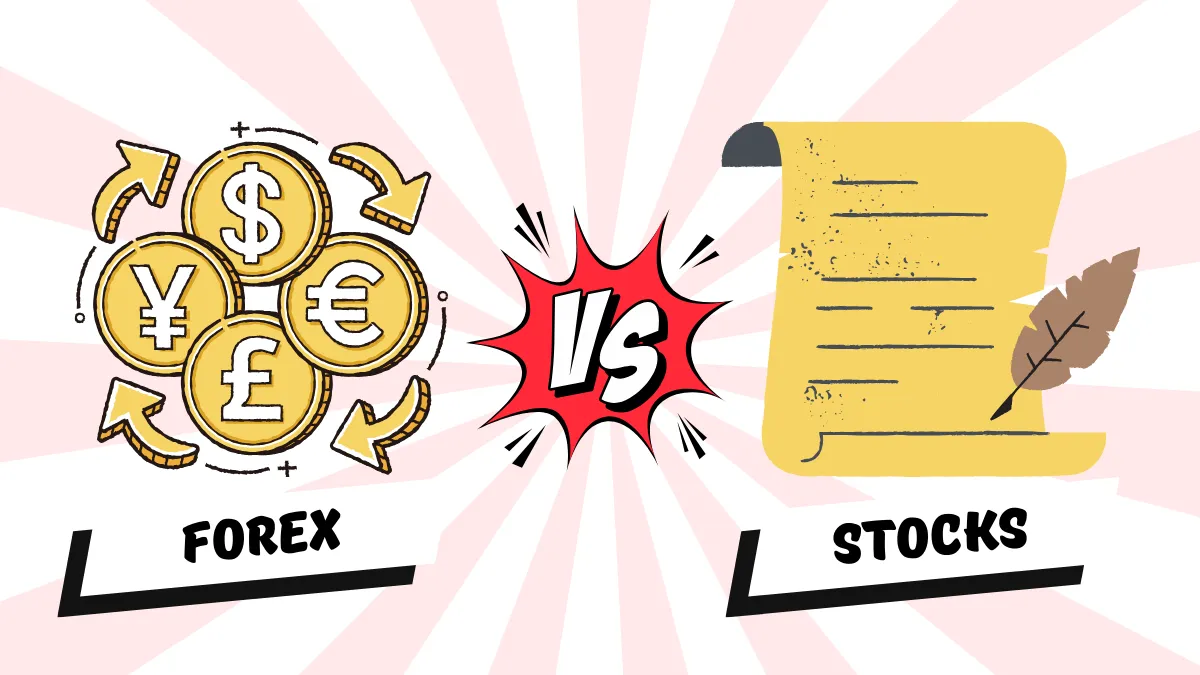Why Choose Forex Trading: Forex vs. Stocks
When investors choose financial markets, the forex market is often compared to the stock market. Both have their advantages, but forex trading offers traders more flexibility and potential opportunities in some aspects. Here are several key advantages of the forex market compared to the stock market:
1. Market Size and Liquidity
The forex market is the largest financial market in the world, with an average daily trading volume of up to 7.5 trillion USD. In contrast, the largest stock market globally—the New York Stock Exchange (NYSE) —has an average daily trading volume of only about 20 billion USD. Such a massive market size gives the forex market higher liquidity, allowing traders to complete transactions quickly, whether they are making small or large trades, and often at prices close to market quotes.
2. 24-Hour Operation vs. Limited Trading Hours
Another advantage of the forex market is that it operates almost 24 hours a day, allowing trading at any time from Monday to Friday. Different financial centers (such as New York, London, Tokyo) open in turn, ensuring that traders can trade regardless of their time zone. In contrast, the stock market has fixed trading hours, such as the US stock market, which is limited to a few hours on working days, potentially restricting investors' flexibility.
3. Flexibility of Two-Way Trading
The forex market allows traders to operate in both directions, meaning traders can buy when they expect a currency to appreciate and sell when they expect a currency to depreciate. Compared to the stock market, stocks can typically only be bought for profit when the market rises; if the market falls, losses may occur. Although the stock market also has short-selling mechanisms, for most investors, the two-way trading in the forex market is more flexible.
4. Leverage Trading Advantages
The forex market offers high leverage, allowing traders to control large trading positions with a small amount of capital. This enables forex traders to amplify potential profit opportunities. In contrast, leverage operations in the stock market are relatively limited, usually applicable only to specific trading instruments, such as options or futures, and are more complex for most retail investors.
5. Market Influencing Factors
The forex market is primarily driven by macroeconomic factors, such as economic data from various countries, interest rate decisions, and political events. This makes the forex market more global and volatile, while the stock market is more influenced by corporate performance, management decisions, and industry trends. The global nature of the forex market allows traders to predict market trends by paying attention to international news and economic data, thus facilitating trading.
6. Lower Trading Costs
Forex trading typically has no commissions or only very low fees, mainly relying on the spread between buying and selling prices as trading costs. In contrast, trading costs in the stock market are usually higher, especially between different platforms and brokers, where commissions and other hidden fees may also apply.
Conclusion
The forex market and the stock market each have different characteristics, but the forex market demonstrates more advantages in liquidity, trading hours, flexibility of two-way trading, and leverage operations. For investors seeking high-frequency trading opportunities, global market influences, and flexible trading hours, the forex market is undoubtedly a more attractive choice.
Hi, we are the Mr.Forex Research Team
Trading requires not just the right mindset, but also useful tools and insights. We focus on global broker reviews, trading system setups (MT4 / MT5, EA, VPS), and practical forex basics. We personally teach you to master the "operating manual" of financial markets, building a professional trading environment from scratch.
If you want to move from theory to practice:
1. Help share this article to let more traders see the truth.
2. Read more articles related to Forex Education.
Trading requires not just the right mindset, but also useful tools and insights. We focus on global broker reviews, trading system setups (MT4 / MT5, EA, VPS), and practical forex basics. We personally teach you to master the "operating manual" of financial markets, building a professional trading environment from scratch.
If you want to move from theory to practice:
1. Help share this article to let more traders see the truth.
2. Read more articles related to Forex Education.





